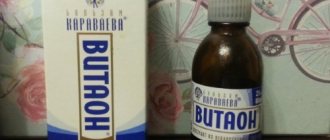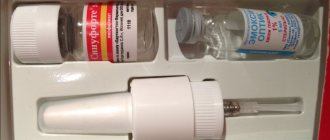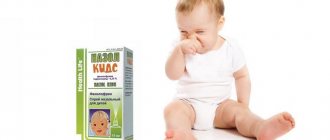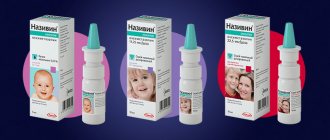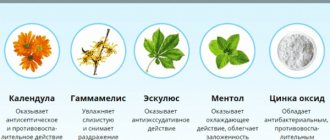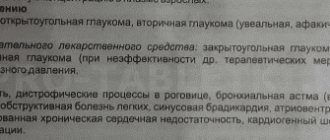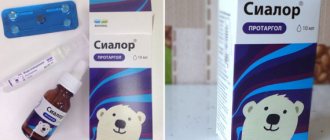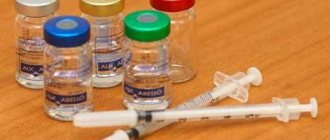During the cold season, children are susceptible to viral diseases, colds and diseases of the ENT organs. A prolonged runny nose makes breathing difficult, the child begins to be capricious, his appetite worsens, and sometimes the temperature rises. For treatment, doctors prescribe different medications, depending on the cause of the runny nose. Pediatricians often prescribe Rinofluimucil to children. This medicine helps even with advanced forms of nasal diseases.
Instructions for use
Rinofluimucil is administered into the nasal cavity in the form of an aerosol using a special sprayer.
Adults are administered 2 doses of aerosol (2 presses on the valve) into each nasal passage 3-4 times a day. For children, the drug is prescribed 1 dose of aerosol (1 press on the valve) in each nasal passage 3-4 times a day. The duration of therapy should not exceed 7 days. Do not exceed the recommended dose and course of treatment without consulting your doctor.
Rules for using the drug
- Remove the cap from the bottle with the solution.
- Remove the cap from the sprayer.
- Remove the cap from the sprayer.
- Activate the sprayer by pressing again.
Preparation of a solution for inhalation - secrets of a pharmacist
Yes, the benefits of inhaled drug administration are undeniable.
But what about Rinofluimucil, which is available in only one form - a spray? How to prepare an inhalation solution when there is no solution as such at hand? In fact, everything is simple, and domestic craftsmen have long learned to solve such “problems.” We already know that each dose of Rinofluimucil contains exactly 1 ml of solution. To obtain a solution for inhalation, you need to spray one or two doses of spray into a container (one for a child and two for an adult) and dilute them with a neutral solution. It is best to use three milliliters of sodium chloride 0.9%, and the medicine for inhalation with Rinofluimucil can be considered ready. To obtain a therapeutic effect, it is enough to carry out two inhalations per day, the course of therapy is seven days.
Inhalations with Rinofluimucil can be combined with inhalation administration of saline or antiseptic solutions. This will increase the final effectiveness of therapy.
Analogs
There are no analogues of Rinofluimucil for both active ingredients - acetylcysteine and tuaminoheptane. Only Rinoflumucil is produced with this combination of active ingredients.
However, in Russian pharmacies, nasal medications are quite widely available, which are analogues of the drug in terms of therapeutic effects. Some of them are cheaper. These are drugs such as nasal drops “Adrianol”, “Vibrocil” in the form of drops, gel or spray, “Malavit Spray Rino”, “Evkasent”.
Also analogues of “Rinofluimucil” include the drug “,” which contains two antibiotics and has an anti-inflammatory effect. However, before using antibiotics in children, consulting a doctor is not only desirable, but necessary. Addiction to this group of drugs, caused by uncontrolled and often unnecessary use, can have a serious impact during a serious illness, when antibiotic treatment does not give the desired effect. The use of Rinoluimucil together with Polydexa is contraindicated.
Another possible substitute for "Rinofluimucilva" is the drug "". This antibacterial product also contains an antibiotic, so despite its high effectiveness, you do not need to use it yourself. In addition, this medicine is not always effective, for example, in cases where a runny nose is caused by a viral infection. But Rinofluimucil cannot be used simultaneously with Isofra.
Dr. Komarovsky will talk about a runny nose and the medications needed for it in the next video.
Reviews
Evgenia, 26 years old, Yekaterinburg : “I bought the drug Rinofluimucil to treat sinusitis. I believe that this tool has both advantages and disadvantages. The advantages, of course, include properties that contribute to the rapid elimination of mucus in the nasal openings. I would like to include the high price as a disadvantage. Although it is worth noting that the price fully corresponds to the quality. I also don't like the fact that the shelf life of this drug is too short, only 20 days after opening. But he helps just great!”
Tatyana, 38 years old, Chelyabinsk : “I did not find any shortcomings of the drug. I am not at all bothered by the price and other minor drawbacks such as a short shelf life. Previously, I was treated only with antibiotics, but I decided to try drops once. And, oddly enough, they helped me a lot. Now I will use them more often, it’s a pity that I didn’t know about such a product earlier.”
Andrey, 42 years old : “This remedy actually treats, and does not just relieve the first signs of sinusitis, like many similar drugs. And I don’t throw away the product, I successfully use it the next time I have a runny nose.”
also read about the antibiotic Fluimucil it.
"RINOFLUIMUCIL": composition
Before looking for cheaper rhinofluimucil and analogues, you should first familiarize yourself with its composition.
The active components are:
- acetylcysteine is a white crystalline powder that has a mucolytic and expectorant effect;
- Tuaminoheptane sulfate is an anticongestant, vasoconstrictor, neurotransmitter from the group of alpha-adrenergic agonists, which has a vasoconstrictor effect.
The list of additional substances includes:
- benzalkonium chloride is an antiseptic that has antiprotozoal and antifungal effects;
- methylhydroxypropylcellulose is an ether derivative of methylcellulose used as an emulsifier and food thickener;
- disodium edetate is a powdery crystalline substance used as a detoxifying agent;
- sodium dihydrogen phosphate monohydrate is a colorless crystalline substance that has a mild laxative effect;
- disodium phosphate dodecahydrate is a synthetic food additive in the form of granular powder;
- dithiothreitol, which has a restorative effect;
- sweetener sorbitol 70%;
- food flavoring "mint";
- 96% ethyl alcohol;
- sodium hydroxide – a remedy for reducing acidity in the stomach;
- distilled water as a base.
The Italian spray is produced in the form of a colorless solution in 10 ml glass bottles, equipped with a spray dispenser and packaged in a branded cardboard box.
How does it affect the body? (Pharmacodynamics)
Due to the combination of two active components, it acts as a mucolytic, has a vasoconstrictor pharmacological effect, relieves swelling and inflammation.
Tuaminoheptane sulfate has an anticongestant and vasoconstrictor effect, that is, it narrows the vessels in the nasal cavity, relieves swelling of the mucous membrane, making breathing easier for 4-6 hours. At the same time, the active component of the drug maintains optimal moisture of the mucous membrane without causing addiction.
If a viral infection (rhinitis or sinusitis) is characterized by secretion (mucus), then acetylcysteine, acting as a mucolytic, restores the functioning of the ciliated epithelium. It dilutes the mucopurulent secretion and facilitates its removal from the nasal canals.
Acting in combination, the main components of the drug have an anti-inflammatory and antioxidant effect, reducing the volume of pathogenic microflora.
When administered intranasally and following the dosage, the active components are practically not absorbed into the body.
Indications for use:
Used in ENT practice to treat:
- various forms of rhinitis, which are accompanied by purulent mucous discharge;
- sinusitis.
Contraindications
The spray is contraindicated for:
- thyrotoxicosis;
- closed-angle form of glaucoma;
- individual intolerance to components;
- under 3 years of age (exception – vital signs).
Important! The instructions for use of rinofluimucil indicate a prohibition on the simultaneous use of the aerosol with MAO inhibitors and tricyclic antidepressants, including 2 weeks after the end of their use
Side effects
In some cases, the use of a spray can cause side effects such as:
- drying of the mucous membrane of the nasopharynx, nasal and oral cavities;
- arterial hypertension;
- arrhythmias;
- tachycardia;
- rapid heartbeat;
- nausea;
- problems with urination;
- skin rashes;
- inflammation of the sebaceous glands;
- tremor, increased excitability, insomnia, hallucinations (in exceptional cases).
If the regimen is violated, addiction is likely to occur, which can cause changes in the functioning of the nasal mucosa.
Compound
The solution in the spray "Rinofluimucil" contains active and auxiliary components. There are two active substances: acetylcysteine and tuaminoheptane sulfate. Every 100 ml of solution contains 1 and 0.5 mg of these components, respectively.
Acetylcysteine has a mucolytic effect, so when used in a spray it helps to liquefy the contents accumulated in the nasal passages and lateral appendages and remove them.
Tuaminoheptane eliminates excessive redness and swelling of the nasal mucosa. This is a little-known and rather rarely used adrenergic agonist, which has all the properties of substances actively used in the production of anti-runny nose medications. It constricts blood vessels, reduces swelling and redness in the nasal cavity, and makes breathing easier.
Due to the short period of action, tuaminoheptane is not used in the production of monodrugs, that is, drugs with one active ingredient. In combination with acetylcysteine, tuaminoheptane works effectively, which accounts for the high therapeutic effect of the Rinofluimucil spray.
Modern medications are complex chemical compounds, so they contain not only active ingredients, but also auxiliary components. These are mainly stabilizers and preservatives that keep the drug formula stable and the drug effective throughout its shelf life.
The composition of "Rinofluimcucil" includes the preservative disodium edetate, sodium dihydrogen phosphate - a buffer food additive, sorbitol 70% - a sugar substitute, as well as benzalkonium chloride - an aseptic drug that also has an antifungal effect, mint flavor, a small amount of ethanol and purified water.
Contraindications
Like most medications, Rinofluimucil spray has contraindications for use. They are associated with possible negative effects if the child has a chronic disease or is taking other medications.
So, Rinofluimucil spray is not used:
- if the child has been identified as having an individual sensitivity to the components;
- with angle-closure glaucoma - a congenital or acquired eye disease in which intraocular pressure is constantly increased;
- thyrotoxicosis, that is, an excess of thyroid hormones.
In some cases, these diseases occur in parallel. You cannot treat a child of any age who is taking MAO inhibitors and tricyclic antidepressants with Rinofluucil, or within 14 days after the last use of these drugs.
For some chronic diseases, taking Rinofluimucil is permitted with caution. Most often this means that treatment must be supervised by a doctor.
The manufacturer lists such diseases as bronchial asthma, chronic high blood pressure, and angina pectoris.
Side effects
In the vast majority of patients, Rinofluimucil is well tolerated. However, like any medicine, it can cause adverse events. The side effects of Rinofluimucil are quite traditional for vasoconstrictors: after its use, tachycardia, a slight increase in blood pressure, and dryness of the nasopharyngeal mucosa may develop. But as a rule, these adverse events are not dangerous and do not serve as a reason to stop treatment.
What is Rinofluimucil used for?
The instructions for the drug state that it is very successfully able to cope with the following types of rhinitis:
- vasomotor rhinitis;
- prolonged and chronic rhinitis (with a large amount of mucous or purulent secretion);
- rhinopharyngitis with severe inflammation;
- prolonged and chronic sinusitis (sinusitis, frontal sinusitis);
- allergic rhinitis (as an adjuvant in combination with other antiallergic drugs).
As reviews indicate, Rinofluimucil is quite effective for the treatment of the above diseases, in particular, the drug provides rapid relief from severe symptoms, facilitates the removal of secretions from the nasal cavity and relieves pain associated with swelling of the mucous membrane.
special instructions
Despite its high efficiency and volumetric composition, Rinofluimucil does not belong to the group of antibiotics.
When treating rhinitis that occurs against the background of serious illnesses, this drug cannot be used as the main means of therapy.
Such pathologies require complex treatment with several drugs simultaneously.
When using Rinofluimucil, it is necessary to study the nuances specified by the manufacturer.
Special instructions when using Rinofluimucil are the following nuances:
- in some cases, the drug can be prescribed to children under three years of age (the manufacturer allows the use of the spray at this age, but only with special indications from a specialist);
- when treating adenoids, it is not recommended to use Rinofluimucil (the drug will cope with the task of relieving swelling, but will not eliminate the cause of the disease);
- the drug cannot be used during therapy with MAO inhibitors (there is a high risk of complications and negative reactions from the child’s body);
- if Rinofluimucil is used in combination with antihypertensive drugs, the therapy may be weakened;
- Rinofluimucil cannot be instilled using a pipette (the drug must be used in strict accordance with the instructions);
- if you use the spray longer than the prescribed course, then after its abrupt cancellation there will be a powerful dilation of the blood vessels in the nasal sinuses (this condition will manifest itself in the form of nasal congestion);
- Rinofluimucil is not prescribed during therapy with tricyclic antidepressants;
- after a week of using a nasal remedy, there is a risk of the child’s body becoming accustomed to its components and reducing the effectiveness of therapy.
Contraindications and side effects
Has contraindications for use. Not recommended for:
- hypersensitivity to the components of the composition;
- angle-closure glaucoma;
- thyrotoxicosis;
- simultaneous use of antidepressants and MAO inhibitors for 14 days after their withdrawal.
The drug is used with caution for children under 3 years of age, with congenital angina and frequent changes in heart rhythm. Can be taken during pregnancy and lactation if there are no clinical contraindications
When used correctly, it does not cause side effects. In case of overdose or non-compliance with the regimen of use, an increase in blood pressure, anxiety and hand tremors may occur. The product may be addictive; the course of treatment should not exceed 7 days.
Use of Rinofluimucil for children
According to the official instructions, Rinofluimucil can be used to treat all children over three years old without worry or worry.
Information about the possibilities of using the drug for patients under three years of age is rather scarce: in the chapter “Special Instructions” it is dryly noted that at this age Rinofluimucil should be used with caution. Let's decipher the encoded messages that the manufacturer hid behind common phrases that are incomprehensible to mere mortals. So, if the instructions do not explicitly say that the drug is prohibited for use in children under 3 years of age, therefore, a priori it can be used in this category of patients. Another important fact in favor of Rinofluimucil, prescribed for the treatment of young children, is that the drug, when applied topically, does not have a systemic effect. This means that it is not absorbed into the blood at all and is therefore particularly safe. But why then is the manufacturer trying to get around the rough edges and relieve itself of responsibility for prescribing Rinofluimucil to young children?
It's actually simple.
To “give the go-ahead” for the use of a drug in any “special” category of patients—be it infants, pregnant women, or patients with severe systemic disease—the manufacturer must prove the drug’s safety in clinical trials.
Studies of the use of Rinofluimucil in newborns and young children have not been conducted. That is why, despite all the facts that indicate the potential safety of the spray, the instructions contain a warning that frightens parents.
We advise you to study: Rhinorus is a vasoconstrictor drug that treats without drying out the mucous membrane
We would like to add that all nasal and throat sprays should be used with caution when treating children under one year of age. This is due to the likelihood of developing bronchospasm in response to a sudden entry of the drug solution into the nasopharynx.
Advantages of drug treatment, price and analogues
The advantage of using Rinofluimucil in the treatment of sinusitis is its combined effect and convenient release form. Thanks to the dispenser, the active components reach the deep layers of the respiratory system, eliminating severe symptoms. The cost of the spray starts from 270 rubles. Similar in composition and action:
- Fluimucil. A one-component mucolytic agent in the form of an oral solution or tablets. Minus - does not have a vasoconstrictor effect. Price – from 150 rubles.
- Vibrocil. Nasal drops based on phenylephrine and dimethindene. Used to treat sinusitis of an allergic nature, to prepare for surgery. Price – from 300 rubles.
- ACC. Available in the form of syrup and tablets for adults and children. The active substance is acetylcysteine. Facilitates sputum discharge, recommended for sinusitis complicated by cough. Price – from 250 rubles.
When choosing an analogue, you need to pay attention to the composition and pharmacological action. Since there are no direct analogues on the market, sometimes 2-3 single-component products are prescribed
Spray "Rinofluimucil": what it helps with
In ENT practice, the nasal spray "Rinofluimucil" has found wide use - it is recommended in the complex treatment of various diseases accompanied by swelling, hyperemia of the nasal mucosa, as well as the release of pathological viscous secretions.
The drug is recommended by otolaryngologists for the following diseases:
- acute catarrhal rhinitis;
- subacute form of rhinitis with purulent mucous discharge from the nasal turbinates;
- vasomotor variant of the course of rhinitis;
- acute as well as chronic sinusitis in the acute stage.
Significant improvement in well-being occurs when using the medication in patients with sinusitis - acute or chronic, when nasal breathing is excessively difficult due to edematous mucosa and blocking of the anastomosis of the paranasal concha.
Important! Only a specialist should determine the need to prescribe a spray - after carrying out diagnostic procedures
Instructions for use of Rinofluimucil spray, dosage
The spray is intended for intranasal administration into each nasal passage.
Standard dosages of the spray, according to the instructions for use of Rinofluimucil, depend on age:
- Adults are administered 2 doses of aerosol (2 presses on the valve) into each nasal passage 3-4 times a day.
- For children, the drug is prescribed 1 dose of aerosol (1 press on the valve) in each nasal passage 3-4 times a day.
- The duration of therapy should not exceed 7 days.
Before use, remove the cap from the bottle by removing the cap and cap from the sprayer and activate it by pressing it again. One press of the spray valve corresponds to one dose of aerosol.
Treatment should be carried out under medical supervision in patients with frequent extrasystole.
Side effects
The instructions warn about the possibility of developing the following side effects when prescribing Rinofluimucil:
Contraindications
It is contraindicated to prescribe Rinofluimucil spray in the following cases:
- individual intolerance to any of the components of the drug;
- increased functional activity of the thyroid gland (thyrotoxicosis), accompanied by increased secretion of hormones;
- angle-closure glaucoma with increased intraocular pressure;
- simultaneous use of drugs of the pharmacological group tricyclic antidepressants and monoamine oxidase inhibitors (MAOIs), as well as a period of less than 2 weeks after their discontinuation.
The spray is used with caution for children under 3 years of age with concomitant bronchial asthma, angina pectoris of functional class III-IV, increased systemic blood pressure (arterial hypertension), systematic extrasystole (the appearance of extraordinary heart contractions). The use of the drug during pregnancy and breastfeeding is possible only when absolutely necessary and under the supervision of a physician.
The use of the drug during pregnancy and breastfeeding is possible only when absolutely necessary and under the supervision of a physician.
Overdose
It is possible to develop systemic side effects caused by tuaminoheptane (tachycardia, tremor, anxiety, increased blood pressure, addiction).
Symptomatic treatment is recommended.
Drug interactions
Rinofluimucil interacts positively with antibiotics, affecting the rate of progression of the disease. The use of both types of the drug provides comprehensive treatment of the entire body, eliminating not only the manifestations of the disease, but also the very cause of its occurrence.
The drug should not be used simultaneously with antihypertensive drugs, as there is a risk of reducing their ability to normalize blood pressure.
The interaction of Rinofluimucil with psychotropic substances affects the effectiveness of both drugs; symptoms such as:
- Dizziness.
- Nausea.
- Increased blood pressure.
- Increased anxiety.
Medical experts also do not recommend using the drug simultaneously with:
- Oxytocin is a neurohormone that promotes the formation of endorphins (hormones of happiness).
- Alkaloids of royal horns - nitrogen-containing substances of plant origin.
- Antiparkinsonian drugs are medications used to relieve the symptoms of Parkinson's disease.
- Alcoholic drinks.
Does Rinofluimucil spray help with sinusitis, how does it work?
Does the spray help treat sinusitis? It has a targeted mucolytic and vasoconstrictor effect. Upon contact with exudate, it breaks its chemical bonds, due to which nasal mucus becomes liquid
This promotes its removal, which is important for quickly cleansing the sinuses and preventing the accumulation of pus in the respiratory tract
The second active effect of Rinofluimucil is vasoconstrictor. The active substance eliminates congestion, swelling and redness of the mucous membrane. This leads to easier nasal breathing, faster recovery and improved well-being. During treatment, there is no need to use traditional drops of this group, which cause addiction and complications.
Composition and active substance
Available in the form of a nasal spray in a 10 ml bottle with a dispenser for spraying. Beneficial properties are achieved by a combination of two active components:
- Acetylcysteine is a targeted mucolytic. Helps thin and remove mucus. Breaks sulfite bonds of exudate protein cells, has an antioxidant effect.
- Tuaminoheptane sulfate is a vasoconstrictor. Aimed at relieving swelling, hyperemia (redness) of the nasal mucosa and sinuses.
Benzalkonium chloride, sorbitol, mint flavors, ethanol, purified water and sodium hydroxide are used as auxiliary components.
How and for what forms of disease can it be used
The spray can be used for sinusitis, which is accompanied by severe nasal congestion and the release of thick exudate. It is aimed at relieving symptoms, is not capable of destroying the causative agent of the disease, and is effective as part of complex therapy. It is recommended for any form of sinusitis, but if it is infectious in nature (bacterial, viral and fungal), additional use of specialized agents is required. Effectiveness is noted for concomitant bronchitis, frequent and dry cough.
Indications
Thanks to the unique combination of active ingredients, Rinofluimucil is prescribed to children for various types of runny nose. The drug can be used immediately after a runny nose appears, and also if the nasal discharge becomes thicker and contains purulent mucous secretion, and the child develops a so-called yellow runny nose.
For a green runny nose, that is, when the discharge turns greenish due to the presence of substances in it that are produced by the immune system to protect against infection or virus, Rinofluimucil is no less effective.
This drug is prescribed not only for a runny nose, but also for:
- nasal congestion to prevent the disease from developing;
- with sinusitis - inflammation of the mucous membrane of the maxillary sinus;
- with adenoids - proliferation of the nasopharyngeal tonsil;
- with adenoiditis - diseases in which enlargement and inflammation of the adenoids are accompanied by pain, increased body temperature, and redness;
- with sinusitis - inflammation of the mucous membrane of one or more sinuses;
- for otitis media - inflammation of the middle ear as part of complex therapy.
Often these diseases follow one after another or develop simultaneously, since they are the result of deep penetration of an infection or virus into the child’s body.
In addition, the “Rinofluimucil” cough spray helps in cases where it occurs when there is an active flow along the back wall of the throat, and in cases where the cause of a runny nose is an allergy. Allergens can also penetrate the nasal mucosa, irritate it, causing swelling and redness, resulting in congestion and runny nose.
Sometimes parents believe that a runny nose does not need to be treated; it will go away on its own. Rhinitis is a very common symptom of flu and colds, but this does not mean that a runny nose is a harmless condition. The fact is that difficulty breathing not only reduces the quality of life of a child who is forced to breathe through the mouth for a long time, which disrupts normal physiological processes, but also dries out the oral mucosa and promotes faster penetration of viruses into the body.
Difficulty breathing with a runny nose can lead to tissue growth, such as adenoids.
When the nose is stuffy, the child cannot breathe fully; less air enters his body, and, therefore, less oxygen, the lack of which in medicine is called hypoxia. This is a very dangerous condition that affects all organs and tissues of the body, but most of all the brain and heart.
The spray irrigates the mucous membrane better than drops, is able to stay in the nasal cavity longer and penetrate deeper. This greatly enhances its effect. “Rinofluimucil” constricts blood vessels and eliminates swelling, neutralizes toxins that are released during the life of viruses and bacteria, and also dilutes the discharge, facilitating its rapid removal from the nasal cavity.
Application for adenoids
Adenoiditis in young children is common, especially in those who attend preschool institutions - kindergartens or developmental clubs. Constant contact with foreign microflora and infections leads to cold symptoms such as profuse, thick snot and difficulty breathing.
In this case, most ENT doctors prescribe drugs that have a vasoconstrictor effect. Rinofluimucil is one such medicine that is relatively safe for children.
The use of this drug is justified when the child experiences the following symptoms:
- Thick mucus in the nasopharyngeal area.
- Bad dream.
- Night cough.
- Breathing through the mouth.
- The appearance of snoring at night.
- Nervous state throughout the day.
It is important to remember that it is not recommended to treat adenoiditis with Rinofluimucil alone, since the effect of the drug is aimed only at eliminating symptoms. The spray is prescribed as part of a complex treatment, which also includes antibacterial and antiseptic agents that have a complex effect on the body.
For maximum treatment of adenoiditis with Rinofluimucil, it must be combined with the procedure of rinsing the nose with sea water (Aquamaris, Aqualor, Quix, Dolphina and other natural solutions of sea salt).
Complex application is carried out as follows:
- Clear the nasal passages by spraying or instilling sea water.
- Carefully remove mucus either by blowing your nose yourself or using a nozzle (for example, a medical bulb or suction devices of various brands Otrivin, Nose Frida, Chicco).
- Lie on your side or back (depending on the presence of ear diseases) and spray one dose of Rinofluimucil into each nostril of the child.
- Lie down for another 5-10 minutes. to achieve maximum mucolytic effects.
During the period of tonsil disease, antibiotic sprays are often prescribed, which should be applied after 30-60 minutes. after using Rinofluimucil.
Taking mucolytic drugs must be supplemented with plenty of fluids. If thick snot flows down the wall of the nasopharynx, Rinofluimucil is used in combination with warm water: children and adults need it every 20-30 minutes. drink at least half a glass of liquid, which enhances the thinning effect of the drug.
Pharmacological properties
The mechanism of action of rhinofluimucin is the vasoconstrictor, anti-edematous and anti-inflammatory effect of tuaminohapten sulfate - a sympathomimetic amine on the mucous membrane of the nasal cavity, nasopharynx and paranasal sinuses, as a result of which breathing becomes easier and the general well-being of the patient improves, as well as facilitating the outflow of mucus.
Due to its high efficiency, excellent bioavailability and safety, this drug is used for complex and protracted inflammatory processes in the nasal cavity - rhinitis; nasopharynx - rhinopharyngitis, rhinopharyngolaryngitis, as well as in inflammatory processes of the paranasal sinuses - sinusitis: sinusitis, ethmoiditis and frontal sinusitis, which are accompanied by the formation of mucopurulent secretion.
Mechanism of action
Thanks to the interaction of two active substances - tuaminoheptane and acetylcysteine, Rinofluimucil has an effective effect on the common cold. Tuaminoheptane is not an independent medicine; it helps the body cope with congestion in the nasal passages.
Since a runny nose is characterized by dilation of the vessels of the nasal mucosa, which leads to swelling and congestion, the vasoconstrictor component of the drug acts on the adrenaline receptors of these vessels and compresses them. This helps relieve swelling.
At the same time, acetylcysteine thins the existing thick mucus in the nose and sinuses, facilitating its subsequent removal. The pronounced mucolytic effect and anti-inflammatory effect stop the flow of purulent snot and nasal congestion.
Acetylcysteine promotes cell regeneration, which leads to rapid relief of breathing.
While not an antibiotic, the drug has a weak bactericidal effect, but not strong enough to eliminate all hostile bacteria. Based on this, it can be argued that Rinofluimucil only relieves symptoms of ENT diseases that are associated with damage to the nasal passages. The drug does not treat the underlying cause.
Important! The spray is not recommended for use more than 4 times a day, since vasoconstrictor drugs in overdose can increase swelling of the mucous membrane and complicate the process of breathing and clearing mucus from the nose.
A short course of using the spray is caused by the risk of the body becoming dependent on the drug, as a result of which the walls of blood vessels become thinner, the natural processes of narrowing and dilation of blood vessels are disrupted, and the mucous membrane becomes dry. With prolonged exposure to the spray on the nasal cavity, an acute runny nose can become chronic.
Comparison with Protargol, Tizin, Nasonex and Sinuforte
Protargol is an antiseptic with an anti-inflammatory effect based on silver. The product does not thin the mucus and does not facilitate its separation.
Tizin has a pronounced vasoconstrictor and calming effect, quickly facilitates breathing and moisturizes the mucous membranes, but has a very wide list of contraindications, and therefore requires mandatory consultation with a doctor. A significant disadvantage is that it is prohibited for children under 6 years of age.
Nasonex contains a glucocorticosteroid that stops inflammatory processes. Not used for viral infections and before the age of two. It is used mainly for allergic rhinitis.
Sinuforte is a herbal medicinal product, which is a lyophilisate from which a solution is prepared for administration into the nasal sinuses. It shows excellent results in the treatment of all types of ENT diseases affecting the respiratory system, but it has a wide list of contraindications, including age under 5 years, pregnancy and breastfeeding.
